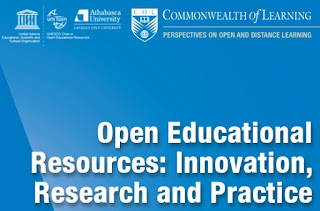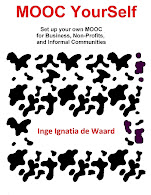26 mai 2013
Free book on Open Educational Resources
 By Inge Ignatia de Waard. While writing up a first workable draft for my probation report (to pass from MPhil to PhD student ... like a first exam, with a defence in front of a small jury), I came across this wonderful free book on Open Educational Resources. The book is a collaboration between UNESCO, Athabasca Uni, Commonwealth of Learning. It might be of interest to everyone looking into online learning, MOOC or simply looking for resources that can be embedded in your own course. OER are used around the world at this point, which gives the concept an added perspective, because an OER can be as local or as global as you make them, fitting the content and the goal of your own or any course. Where I must say I would love to see more local OER.
By Inge Ignatia de Waard. While writing up a first workable draft for my probation report (to pass from MPhil to PhD student ... like a first exam, with a defence in front of a small jury), I came across this wonderful free book on Open Educational Resources. The book is a collaboration between UNESCO, Athabasca Uni, Commonwealth of Learning. It might be of interest to everyone looking into online learning, MOOC or simply looking for resources that can be embedded in your own course. OER are used around the world at this point, which gives the concept an added perspective, because an OER can be as local or as global as you make them, fitting the content and the goal of your own or any course. Where I must say I would love to see more local OER.  A short description of what you can expect by words of the editors of the book: The development and exchange of OER continues to be a technologically intensive process. Technological considerations in OER are not limited to authoring or remixing tools. Collaborative production of OER requires welldesigned and robust online spaces and infrastructure (Wikiwijs) and repositories. The latter can also be used to combine OER to create lesson plans online (Open Science Education Resources in Europe). Unless OER are consistently and adequately described, they cannot easily be located in online searches. The chapter on GLOBE considers these challenges and offers solutions. COL’s earlier publications on OER offered insights and advice on good institutional practices, business models and policy matters. Read more...
A short description of what you can expect by words of the editors of the book: The development and exchange of OER continues to be a technologically intensive process. Technological considerations in OER are not limited to authoring or remixing tools. Collaborative production of OER requires welldesigned and robust online spaces and infrastructure (Wikiwijs) and repositories. The latter can also be used to combine OER to create lesson plans online (Open Science Education Resources in Europe). Unless OER are consistently and adequately described, they cannot easily be located in online searches. The chapter on GLOBE considers these challenges and offers solutions. COL’s earlier publications on OER offered insights and advice on good institutional practices, business models and policy matters. Read more...




/https%3A%2F%2Fprofilepics.canalblog.com%2Fprofilepics%2F1%2F0%2F1076071.jpg)